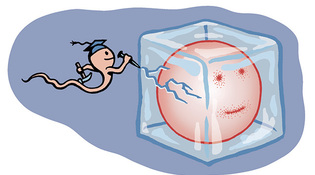 loading
loading
FindingsFamily planningWomen are freezing their eggs till they find the right partner—not necessarily to focus on careers.  Gregory NemecView full imageShe is a media trope: the hard-driving career woman who realizes that her biological clock is on the verge of winding down. Panicking, she freezes her eggs so she can postpone child-bearing a little longer as she pursues the next promotion. But, according to a recent study funded by the National Science Foundation and led by Marcia Inhorn, professor of anthropology and international affairs, and Pasquale Patrizio, director of the Yale Fertility Center, the primary impetus behind the decision to freeze one’s eggs is quite different. The procedure is invasive and expensive, and a successful pregnancy using a frozen egg is far from guaranteed. Still, the number of women freezing their eggs has been rising steadily since 2012, when the American Society for Reproductive Medicine removed the procedure from “experimental” status. To examine the motivations of this first generation of women using the technology, the researchers conducted in-depth interviews with 114 US women—most of them over 35—who had engaged in elective egg freezing (EEF) and who had degrees beyond high school. Of this group, 47 percent had master’s degrees and 34 percent had MD, PhD, or equivalent degrees. They found that over 90 percent of respondents were not intentionally “postponing” fertility because of education or careers. Rather, almost all felt ready to parent, and desired marriage and motherhood. They saw egg freezing as “preserving” fertility—buying time because of a demographic reality: a dearth of educated men willing to commit to family life. The educational achievement gap between US women and men has been growing since the late 1970s. Among college grads in their 30s, there are five women for every four men. That gap is expected to increase. “Many of the women told us that the men they meet are intimidated by their success,” Inhorn says. “We need to get beyond this stereotype of a selfish career woman putting her fertility on hold. EEF is not an individual solution, but a technological response to a still-uneven playing field.”
The comment period has expired.
|
|